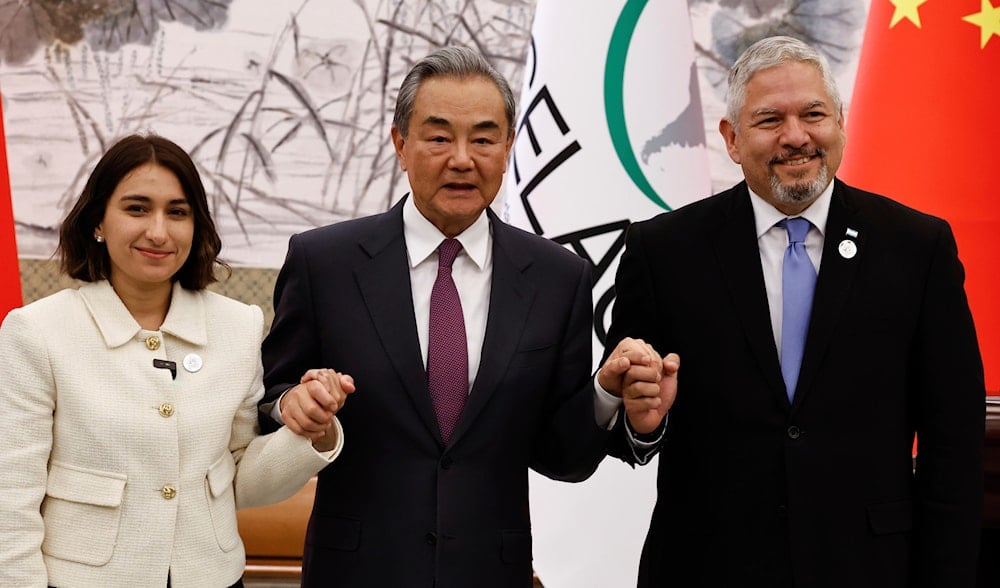Colombia joins Belt and Road as China deepens Latin America ties
At the China-CELAC Forum, Colombia joins a growing number of Latin American nations aligning with Beijing’s development model, signaling a regional shift in global alliances.
-

Honduran Foreign Minister Eduardo Enrique Reina Garcia, Colombian Foreign Minister Laura Sarabia and Chinese Foreign Minister Wang Yi shake hands as they pose for pictures following a press conference for the fourth ministerial meeting of the China-CELAC Forum, at the Diaoyutai State Guesthouse, in Beijing, China, Tuesday, May 13, 2025. (Tingshu Wang/Pool Photo via AP)
Colombia has formally joined China’s Belt and Road Initiative (BRI), in what its government has called a "historic step" that redefines Bogota's place on the international stage. The agreement was signed during the China-CELAC Forum 2025 in Beijing, where regional leaders convened to strengthen economic and political cooperation with China.
Colombia’s Foreign Ministry announced the deal in a post on X, highlighting that it would create "new opportunities for investment, technological cooperation, and sustainable development for both countries."
President Gustavo Petro, who attended the signing ceremony, posted a video of the event, calling the move a redefinition of Colombia’s global outlook. "The history of our foreign relations is changing," he wrote. "From now on, Colombia will interact with the entire world on a footing of equality and freedom."
Cambia la historia de nuestras relaciones exteriores. A partir de ahora Colombia se relaciona con el mundo entero en pie de igualdad y libertad pic.twitter.com/4RQoJpmT59
— Gustavo Petro (@petrogustavo) May 14, 2025
Later, in another X post, Petro officially announced Colombia joining BRI, explaining that his goal in the short term is to "eliminate the trade deficit with China, which amounts to USD 14 billion annually."
As for the medium term, he said he wanted "Colombia and Latin America not only to build interoceanic infrastructure but also to become a landing point for undersea fiber-optic cables from China and Europe, positioning the region as a central hub for artificial intelligence."
Hemos entrado a la franja y la Ruta de la seda. Busco en el corto plazo acabar el déficit comercial con China que llega a USD14.000 millones anuales.
— Gustavo Petro (@petrogustavo) May 14, 2025
En el mediano plazo busco que Colombia y América Latina puedan no solo construir infraestructura interoceánica, sino ser punto de…
"I envision a Colombia that is central on the world stage, as its geographic position and its people deserve," the Colombian president asserted.
The BRI agreement aligns with Petro’s broader efforts to diversify Colombia’s international alliances and to seek economic partnerships beyond traditional Western frameworks, particularly amid waning US influence in the region.
On his part, Chinese President Xi Jinping met with Petro and welcomed Colombia as a new member of what he described as the "high-quality Belt and Road Initiative family." Xi emphasized the importance of "quality upgrading of cooperation" and encouraged joint efforts in infrastructure, energy, technology, and sustainable development.
China's role in Latin America
Colombia joins more than two-thirds of Latin American countries now participating in the BRI. In recent years, China has emerged as the top trading partner for several regional economies, including Brazil, Peru, and Chile, surpassing the United States.
Beijing has also backed strategic infrastructure projects, such as the Chinese-financed deepwater port inaugurated last year in Chancay, Peru, a critical hub for Pacific trade.
During the China-CELAC Forum, Xi pledged $9.2 billion in credit lines for Latin American development initiatives. The funding aims to support infrastructure, renewable energy, education, counterterrorism efforts, and the fight against transnational organized crime.
The commitment reflects China’s broader ambition to position itself as a leader in the Global South and to promote multilateralism as an alternative to US-led geopolitical influence.
Strategic implications and global realignment
Colombia's entry into the BRI underscores shifting geopolitical alignments in Latin America, where China is increasingly viewed as a reliable partner for long-term development and strategic investment.
As Bogota deepens its ties with Beijing, the move also reflects broader trends in the Global South toward multipolar engagement and reduced dependence on traditional Western powers.
The Belt and Road Initiative, launched by Xi Jinping in 2013, continues to serve as a cornerstone of China’s foreign policy, leveraging infrastructure and development projects to forge deeper political and economic ties across continents.
Read next: China, Latin America unite in face of Trump's tariffs, trade war

 4 Min Read
4 Min Read










